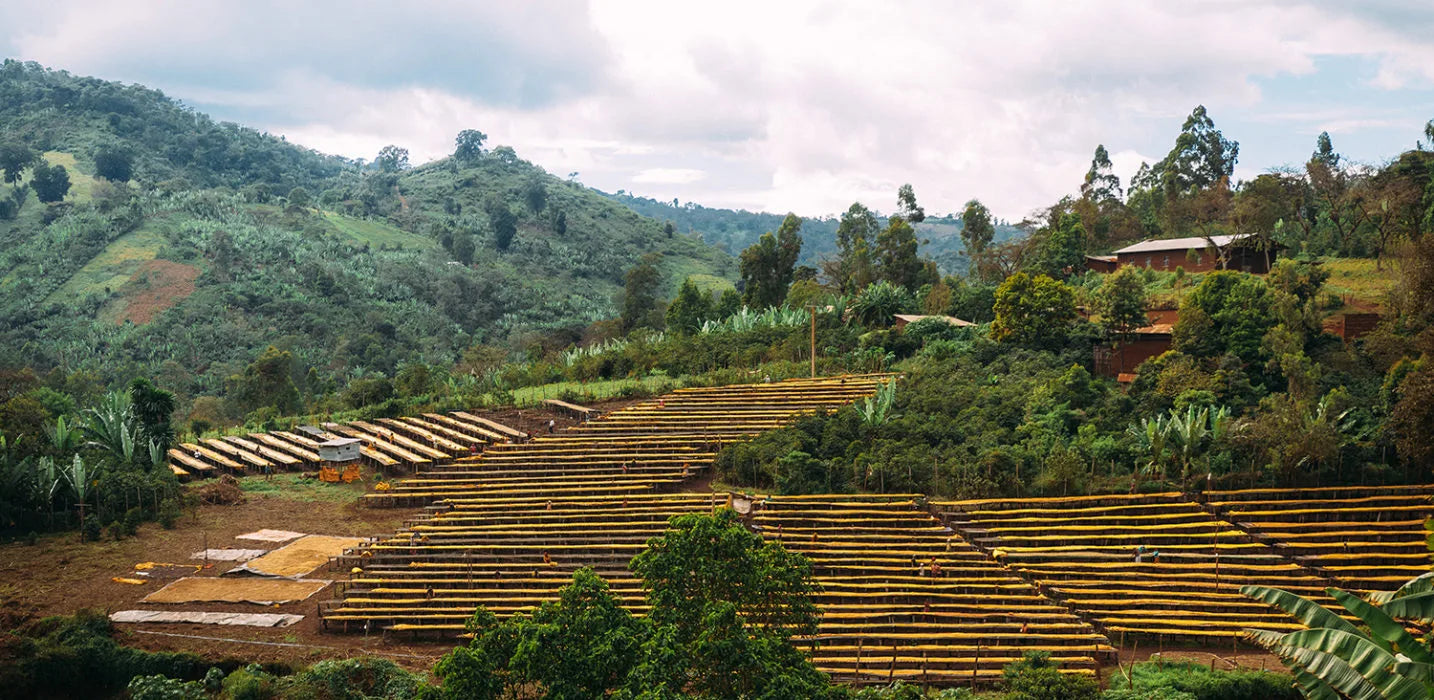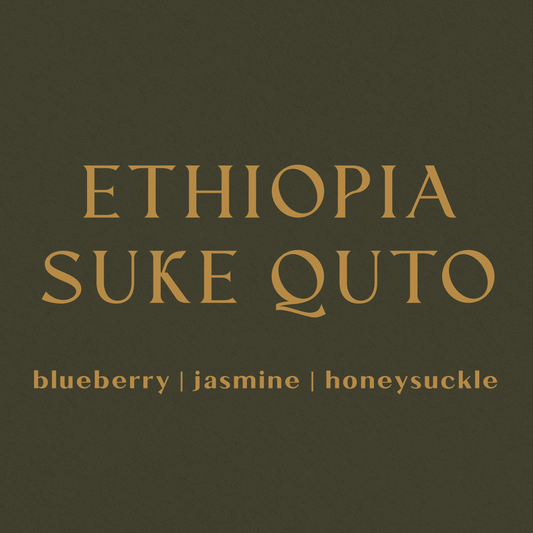
Suke Quto
Suke Quto Coffee Farm: Regenerative Agriculture and Specialty Coffee in Guji, Ethiopia
1. Overview and Location
Suke Quto is a pioneering specialty coffee farm located in the Guji Zone of Oromia, southern Ethiopia, specifically near the town of Shakisso. The farm sits at elevations between 1,800 and 2,200 meters above sea level, within a highland rainforest ecosystem characterized by volcanic soils, lush canopy cover, and consistent rainfall—ideal conditions for cultivating high-quality Arabica coffee.
Founded and operated by Tesfaye Bekele, Suke Quto has become one of the most recognizable names in Ethiopian specialty coffee, known for its sustainable agroforestry model, community integration, and consistent cup quality.
2. Historical Background
Suke Quto was born out of environmental tragedy and a visionary response. In the late 1990s, extensive forest fires in the Guji region destroyed large tracts of land. At the time, Tesfaye Bekele, working in forestry and environmental protection, witnessed firsthand how land was being converted to annual crops such as maize and teff—leading to erosion and long-term soil degradation.
Bekele proposed an alternative: planting coffee under shade trees to regenerate the forest and create sustainable livelihoods. In 2000, he established Suke Quto as both a farm and a nursery. Initially met with skepticism, Bekele’s decision to wait the required 4–5 years for his coffee trees to bear fruit ultimately proved successful, inspiring surrounding farmers to adopt the same model.
3. Farm Structure and Cooperative Model
Suke Quto spans approximately 221 hectares and grows indigenous Ethiopian landrace varieties, particularly Kurume and Welicho. In addition to Bekele’s own estate, Suke Quto functions as a processing and purchasing hub for more than 170 to 280 smallholder outgrowers in the surrounding area. These producers follow similar forest-friendly, organic farming practices and deliver cherries to the Suke Quto washing station.
The farm and outgrowers operate under a shared quality philosophy, emphasizing sustainable cultivation, organic inputs, and careful cherry selection. The result is a community-driven supply chain that supports consistent and traceable specialty coffee production.
4. Processing Techniques
Suke Quto processes both washed and natural (dry) coffees, and occasionally honey-processed lots. Processing is meticulous, with an emphasis on cleanliness and fermentation control.
Washed Process:
Ripe cherries are depulped using an Agared eco-pulper
Fermentation lasts 35 to 48 hours, depending on altitude and temperature
Beans are washed and then dried on raised beds for 9 to 15 days
Wastewater is treated and recycled through natural lagoon systems
Natural Process:
Cherries are hand-sorted and dried whole on African raised beds
Drying takes up to 3 weeks, with cherries turned regularly for uniformity
Sorting continues post-drying to remove overfermented or damaged beans
These processing techniques contribute to Suke Quto’s consistently high cupping scores and sensory appeal.
5. Environmental and Social Sustainability
Suke Quto was founded on ecological principles and continues to operate as a model of regenerative agriculture. The coffee trees grow under a dense forest canopy, with organic mulching from coffee pulp and pruned plant matter returning nutrients to the soil.
Bekele also operates a coffee nursery to provide seedlings to local farmers, helping ensure genetic diversity and plant health across the region. The farm is Rainforest Alliance and Organic certified, adhering to international standards for environmental stewardship and social responsibility.
On the social side, Tesfaye Bekele and his partners have invested in local infrastructure, including the construction of schools and the promotion of agronomic education for smallholders.
6. Flavor Profile and Recognition
Suke Quto coffees are known for their refined, floral-forward profiles and balanced structure. Washed lots often feature notes of:
Jasmine
Lemon zest
Chamomile
Peach
Tea-like acidity and clarity
Naturals, on the other hand, bring deeper fruit and wine-like characteristics:
Blueberry
Cherry cola
Grape must
Dark chocolate and plum
These distinctive profiles have earned Suke Quto a place in roasters’ offerings around the world. Leading specialty coffee brands including Stumptown, Partners Coffee, Trabocca, Swiss Water Decaf, and Tectonic Coffee have featured Suke Quto coffees in their lineups.
7. Export and Market Positioning
Suke Quto’s long-standing relationship with Trabocca, a Netherlands-based green coffee importer, has enabled consistent export quality, traceability, and farmer support. Through direct export and the Ethiopian Coffee Exchange (ECX), Suke Quto coffees are now available in North America, Europe, Asia, and Oceania.
In addition to whole bean coffee, some lots are selected for decaffeination via the Swiss Water process, further extending the brand’s reach into the growing decaf specialty market.
8. Conclusion
Suke Quto stands as a model for what’s possible in specialty coffee: ecological regeneration, social empowerment, and exceptional cup quality, all rooted in indigenous Ethiopian varietals and farmer-first values. Its success has helped define Guji as a distinct and celebrated coffee origin, and Tesfaye Bekele’s leadership continues to inspire both producers and buyers across the industry.
Shop Coffees from Suke Quto
-
 Sold out
Sold outEthiopia Suke Quto
Regular price From $20.00 USDRegular priceUnit price / per



